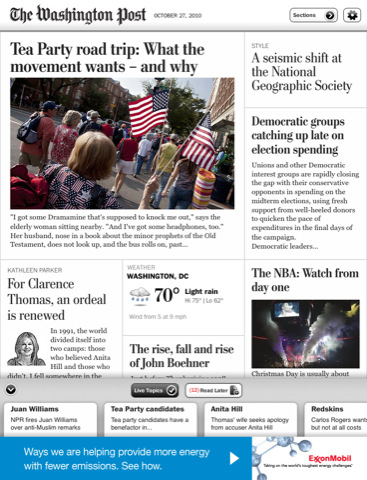Apple's luxury tax should spark a showdown with publishers - but will it?

Just as all of the big content providers were starting to get chummy with Apple and its media savior - the mighty iPad - ol’ Steve Jobs went and pulled a fast one on his new publisher buddies.
He changed the rules of the game and hit them with a new revenue-sharing structure that essentially forces publishers who charge subscriptions outside of the app to either cough up a 30 percent tax on subscriptions purchased from inside the app or do business elsewhere.
And just as anyone could have guessed, the cries of “antitrust” have already begun - even though that argument won’t stand a chance once everyone remembers that a flood of tablets are about to hit the market.
You see, while publishers may want to cry foul over having to pay such a high premium, they really can’t. Plain and simple, Apple is charging the equivalent of a luxury tax, a premium that a publisher must pay for the privilege of conducting business in Apple’s neighborhood, just as luxury retailers pay a premium for a storefront presence along New York’s Fifth Avenue or Beverly Hills’ Rodeo Drive.
If they don’t like the new rules, of course, they don’t have to play by them. They can always pull the app out of Apple’s neighborhood and continue to charge a subscription through a browser transaction that they control (including the customer information, valuable data that Apple also controls under its rules.) Not everyone has to have a Fifth Avenue presence, even though that’s where tens of millions of people are reading, shopping, playing and otherwise “iPad”ing.
Or do they?
Certainly, any publisher that’s looking broaden its reach - and which ones aren’t - has an iPad strategy. But, as Larry Dignan suggested in a post yesterday, it may be time for the big players who would be hardest hit - folks like Netflix, the New York Times, Hulu, Sirius XM and others - to take a stand and pull their iPad apps in protest.
In essence, they’d be calling out Steve Jobs, publicly reminding him that those 60,000 apps don’t mean squat if the iPad doesn’t have the biggest and most popular apps. Apple could, of course, counter back with a “dumping Flash didn’t seem to hurt sales” argument or even just a quick “you need us more than we need you” jab to remind the publishers who’s holding the cards.
But here’s a thought: If Apple loses some big-named apps over this latest change of the rules, then how long will iPad owners continue to tolerate a compromised experience - all in the name of Apple’s personal business battles? They’ve already accepted that anything Flash isn’t going to play. What’s next? A big publication? E-books? Streaming music? At some point, even those who line up by the millions to buy the latest and greatest from Apple will start to wonder why their iPad can’t do this or can’t do that.
At this point, it’s a question worth pondering, but not one that Apple should be losing sleep over. The iPad will continue to do well, breaking sales records and making more money for the shareholders. In this game of chicken, Apple still has the upper hand.
For now.